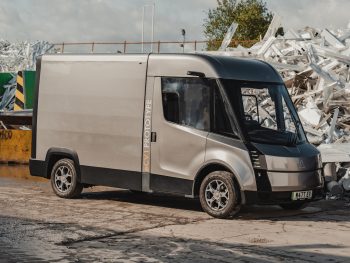WEVC electric van to feature industry-first low-carbon aluminium
UK start-up Watt Electric Vehicle Company (WEVC) has struck a deal to slash production emissions of its electric light van.
It’s working with Norwegian industrial company Hydro to explore the use of certified recycled and low-carbon aluminium to produce bespoke patented extrusions for the upcoming eCV1 van, previewed at the CV Show earlier this year in prototype form.
Hydro’s low-carbon aluminium carries a CO2 footprint of 4.0kg CO2 per tonne – compared to a claimed world average of 16.7kg – due in part to the renewable energy used in the production process.
The two companies will also evaluate using recycled aluminium with a lower carbon footprint in UK-manufactured automotive structures for the first time.
WEVC says the tie-up will cut embedded carbon in the production of the eCV1 by more than 50% compared to other electric LCVs – a cornerstone of its work in delivering its sustainability objectives.
Neil Yates, CEO of WEVC, explained: “We started WEVC from a clean sheet of paper so are not restricted by legacy platforms or components, giving us freedom in both design and manufacture. Part of our design approach is the patented FlexTech technology used for our aluminium chassis, which gives incredible levels of flexibility and customisation opportunities, but crucially is also very light.
“In Hydro we have the perfect partner who can deliver very high-quality ‘greener’ aluminium products, which bring a significant reduction in embedded carbon. Forming a development partnership with Hydro allows us to together make sure the new alloys have all the right strength and durability attributes and the lowest possible manufacturing emissions while considering the entire supply chain.”
The partnership with Hydro will also explore wider opportunities such as more sustainable closed-loop recycling during manufacture through to end-of-vehicle life recycling options – supporting a focus at WEVC on embracing the circular economy.
Paul Warton, EVP Hydro Extrusions, added: “We are discussing with WEVC how we can work together to build a closed loop recycling process for the eCV1 at the eventual end of the vehicle’s life. Having the vehicle manufacturer directly returning pure Hydro aluminium products, which are a known quantity in terms of quality and type of alloy, makes reprocessing easier and reduces the carbon footprint of the resulting aluminium products drastically.”
The first of multiple commercial vehicle offerings to come from WEVC, the eCV1 uses the FlexTech architecture to provide a “sophisticated yet cost-effective” modular electric vehicle platform that will enable a range of mission-specific models to meet particular fleet needs.
Developed to support commercial fleet operators and specialist vehicle converters in the move to an electric future, eCV1 will comply with GB and EU regulations and exceed European Type Approval homologation standards, according to WEVC.
The company is planning production of 5,000 vehicles per annum and says it’s attracted strong interest from blue-chip companies.
The WEVC eCV1 prototype has a kerb weight from 1,750kg, said to deliver class-leading payload and range in the 3.5- and 4.25-tonne segments. Real-world testing started earlier this year ahead of full design verification test sign-off and a planned start of production in 2025.
electric vanHydroWatt Electric Vehicle Company (WEVC)WEVC eCV1


